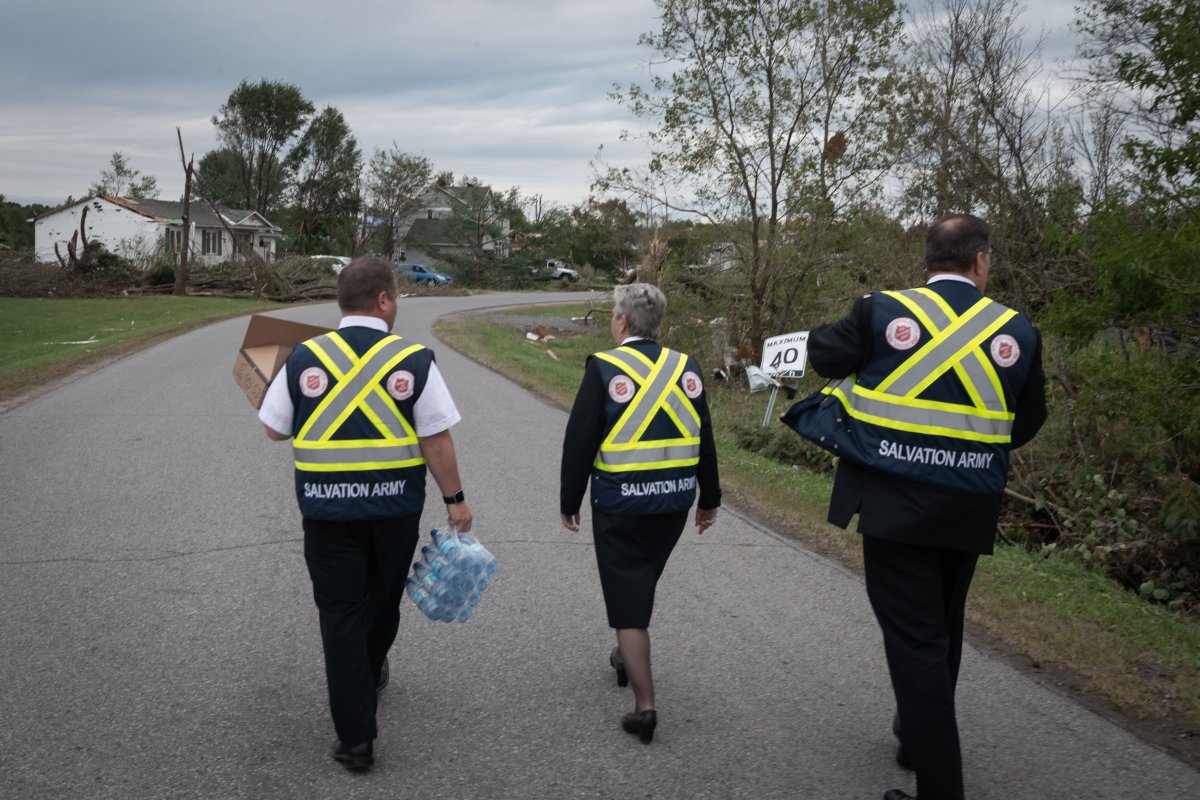In the days after an EF-3 tornado tore through Dunrobin in September, Salvation Army pastor and Peterborough resident Major Bert Sharp went door-to-door in the west Ottawa community, delivering sandwiches, water bottles and cups of coffee to residents whose homes were damaged or destroyed by the violent twister.

As he did that, some people opened up to him, he said — and, as someone trained by the charity to provide emotional and spiritual support in emergency and disaster operations, he stuck around to listen and talk them through their situation.
“People are just trying to get a handle on themselves … Their whole world has turned right upside down,” Sharp said in a phone interview earlier this month.
“It’s hard to know what to do. They struggle with processing and understanding what is happening.”

Salvation Army officials say they’re hoping to get more local staff and volunteers trained to provide that kind of emotional support — whether religious or not — when they’re in the field, because they had too few of them to draw on during their 10-day disaster response to the two Ottawa tornadoes.
“We needed more people so we weren’t exhausting or draining those that were equipped to do it,” said Jeffrey Robertson, the organization’s divisional director of emergency and disaster services.
The Salvation Army had a similar experience with strained resources a year and a half earlier during the devastating floods in the spring of 2017, Robertson said. That multi-week response effort triggered a push to host more training opportunities for Salvation Army folks in the Ottawa area.
That effort has resulted in a three-day training conference scheduled to kick off next Thursday in the national capital, for staff and volunteers from across the country who work in the Salvation Army’s emergency disaster services program.
In addition to providing two days of advanced training in emotional and spiritual care during the event, the charity is also hosting workshops and sessions on food safety and canteen operations, so it can also rotate volunteers with those skills more frequently during disaster operations.
While the Salvation Army’s conference in Ottawa was planned before the tornadoes hit seven months ago, it still comes “at a great time” for the organization, officials say.
“It ended up being fortuitous because we are hoping to expand and it allows more of the local people to attend and get advanced training,” said Perron Goodyear, territorial director of the Salvation Army’s emergency disaster services in Canada and Bermuda.
‘Psychological first aid’
Salvation Army personnel, too, were asking for high-level training on emotional and spiritual care as the conference was being planned, according to Goodyear.
Like Sharp, they say their gestures of practical support on the ground — like distributing food and drink — frequently trigger an emotional response from the people they’re helping. When that happens, the organization wants its workers to be able to respond appropriately, Goodyear said in a phone interview.
“We would almost call it a ‘psychological first aid,'” he explained.
People affected by disasters can become emotionally tired quickly and some may also be dealing with trauma, the two Salvation Army directors said. Because of this, Robertson said it’s important staff and volunteers know what to say when they interact with vulnerable residents — and also what not to say.
WATCH (Sept. 23, 2018): Homeowners in Ottawa speaks about losing home after tornado hits region

For his part, Sharp said he focuses on helping people understand that “they’re not alone.”
“That even though they’re facing something that’s very abnormal, their response is normal … their pain, their struggle,” he said.
While the Salvation Army is a Christian organization, officials said the emotional and spiritual care they offer vulnerable people is “for everybody.”
“We don’t do this to teach about our faith,” Robertson said. “It someone brings it up, we can talk about it with them but for the most part, it’s coming and showing love to people who are in need.”
A report the Salvation Army issued after last fall’s tornadoes in Ottawa noted staff made 125 “emotional and spiritual care connections” with affected homeowners.
Emergency Preparedness Week kicks off May 5
In order to partake in this week’s national conference, staff and volunteers need to have already taken some introductory courses with the Salvation Army, which are hosted at the local level. The conferences, which the charity holds every second year, are an opportunity to receive more advanced training.
The conference comes ahead of Emergency Preparedness Week in Canada, which kicks off on May 5. Public safety officials and first responders, among others, use the awareness week to urge Canadians to “take concrete actions to be better prepared to protect themselves and their families during emergencies.”
Robertson said the Salvation Army is doing its own emergency prep right now, in anticipation of rising water levels and heavy rainfall in Ottawa and other parts of Ontario.
“We’re planning now to be ready for what may be inevitable flooding again this spring, because it seems to be close every year unfortunately,” Robertson said.
- Posters promoting ‘Steal From Loblaws Day’ are circulating. How did we get here?
- Canadian food banks are on the brink: ‘This is not a sustainable situation’
- Video shows Ontario police sharing Trudeau’s location with protester, investigation launched
- Solar eclipse eye damage: More than 160 cases reported in Ontario, Quebec






Comments